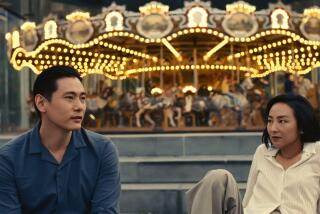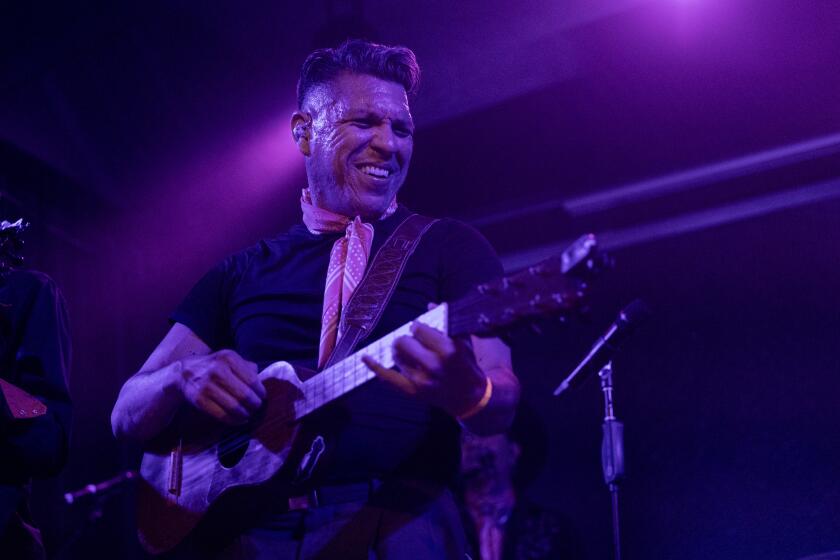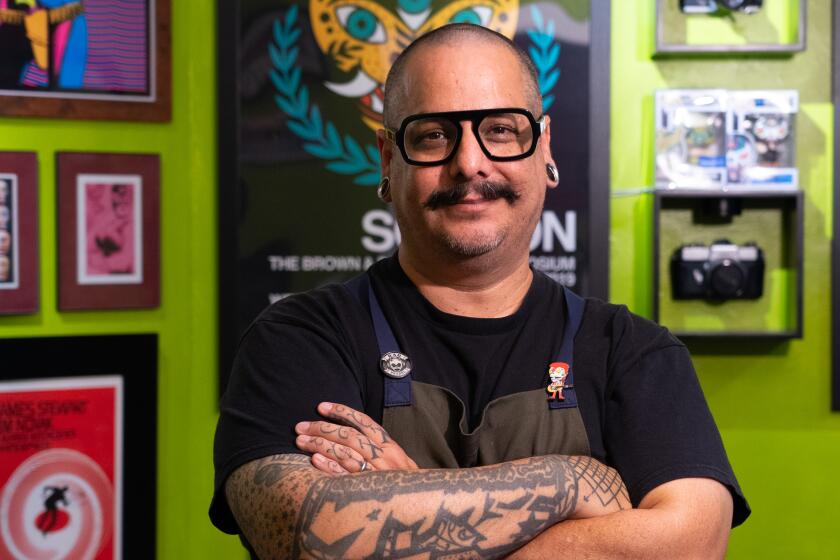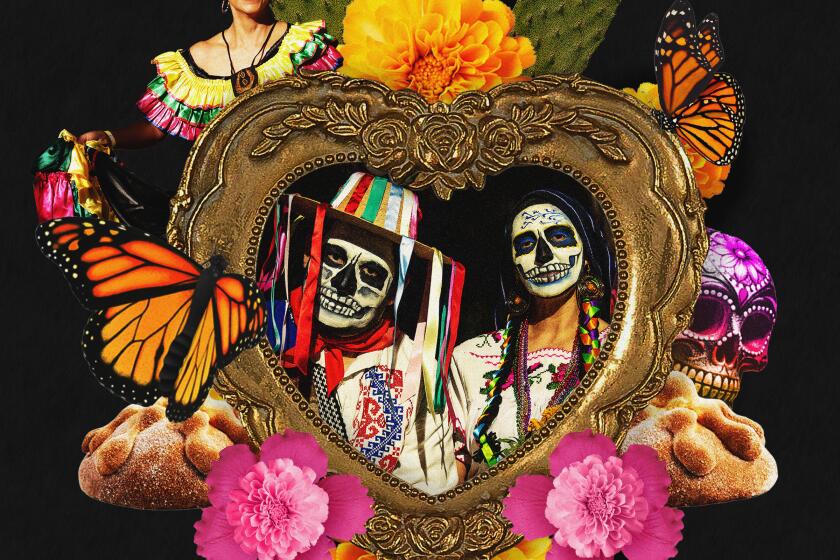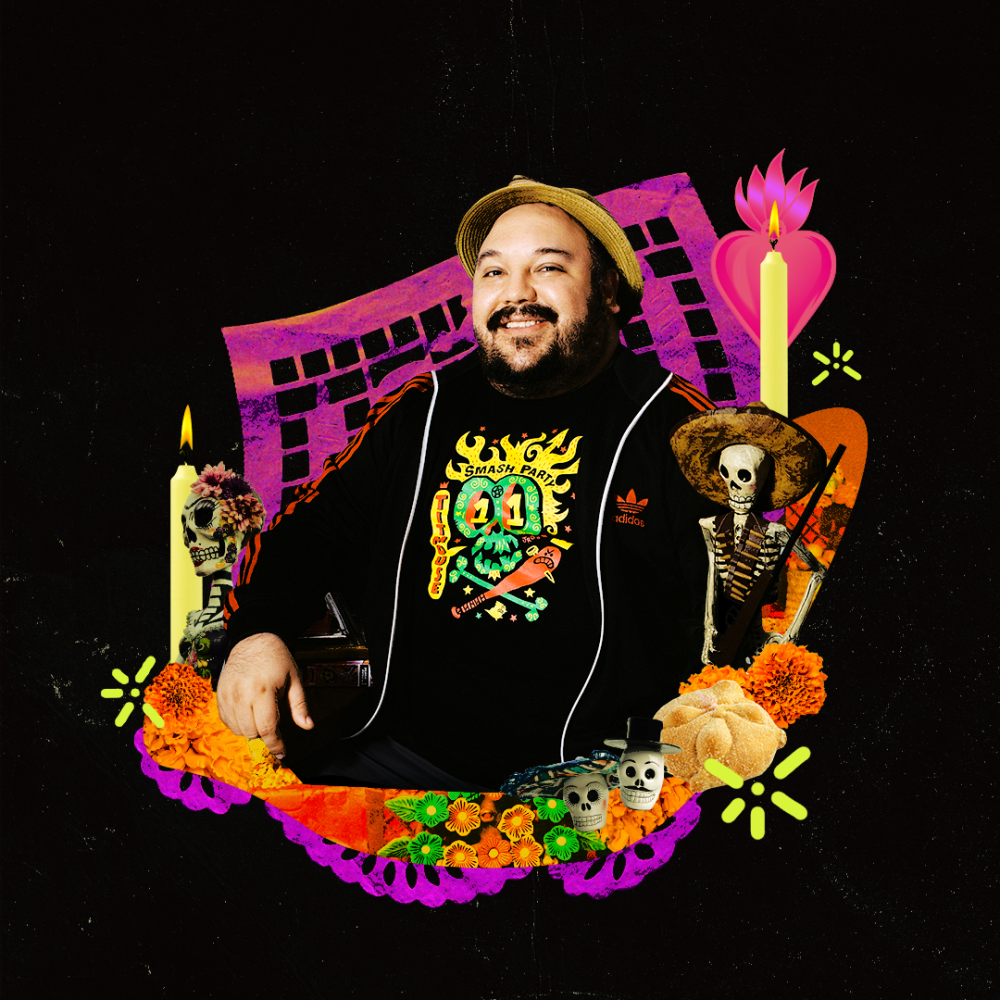
This year marks the 10th anniversary of Jorge R. Gutierrez’s “The Book of Life,” a spirited storybook animation that weaved elements of the Day of the Dead at a time when Hollywood seldom embraced the Mexican holiday.
Produced by renowned Mexican director Guillermo del Toro, the English-language film centered on the feud between Manolo (Diego Luna) and Joaquin (Channing Tatum) as they competed for Maria (Zoe Saldana). The fervid love conquest inspires a wager between La Muerte (Kate del Castillo), ruler of the Land of the Remembered, and Xibalba (Ron Perlman), ruler of the Land of the Forgotten.
The Academy Museum will host a special viewing 11 a.m. Nov. 2 at the Ted Mann Theater.
After facing multiple rejections from top animation studios for its underlying morbidity, “The Book of Life” was finally greenlit in 2010 by Reel FX Animation, a budding visual effects studio based in Texas, according to Gutierrez. The animation was later distributed by 20th Century Fox, grossed nearly $100 million globally and received a Golden Globe nomination for best animated motion picture in 2015.
We caught up with the writer-director to discuss the film’s beginning, cultural impact, the “Coco” effect and more. The interview has been edited for clarity and length.
Wow, 10 years since the movie’s release, how are you feeling?
When it got made I really worried that I peaked [because] my dream came true really early. I was a little depressed after the movie came out. Now with time, we get pictures from all over the world and people get tattoos of the movie. It hit the top 10 on Netflix worldwide last Christmas! It’s like watching your kid grow up.
What was it like to embrace Dia de Muertos when it wasn’t mainstream?
What happened to me was that my best friend Mauricio in Mexico City passed away and I got really angry as a little kid because I said it wasn’t fair.
My mom sat me down and explained Dia de Muertos. She said, “It’s not just a day, it’s a concept, as long as you talk about your friend, eat his favorite food, watch his favorite movies, he’s here. The moment you forget him, then he is really gone.”
She basically deciphered it. I became enamored [with the concept]. So I wanted to share that with the world. I want to show off our culture and invite the world to participate.
Back then, I can honestly tell you, when I started pitching the movie, every studio told me the same thing, “No one wants to see a movie about dead Mexicans. This is macabre. You cannot make a children animated feature to celebrate death.” Endlessly I was told this, so I was a little bit ahead of the curve, honestly.
After hearing so many no’s, what made people say yes?
DreamWorks Animation called me up and said, “Hey, do you have any Day of the Dead movie ideas?” And I said, “Yeah, I pitched you one 10 years ago and you told me it was macabre and amateurish.” So I basically sent the same document, I just changed the cover letter.
[DreamWorks] loved it. I was over there for a year, then at some point they go, “[It’s going to be] a movie about a wooden Mexican matador who dies to be reunited with the love of his life. It can’t take place in Mexico, no bullfighting, no wooden figures and we’re going to pair you up with … Lin-Manuel Miranda, and it’s going to be a hip-hop salsa reggaeton musical set in Washington Heights.”
I told this story to Lin, and I said, “Well you tell Lin-Manuel Miranda, you tell her good luck with her career and I quit.”
This little studio that had never made a theatrical movie called Reel FX in Dallas approached me and said that if I move to Texas, they will let me write and direct this movie. “If you believe in us, we will believe in you,” and that’s all I asked for.
How did you secure big names like Guillermo del Toro?
I ended up pitching him the movie in five minutes outside his house, and then my people betrayed me. All the leaf blower guys in the mansion next door turned on their leaf blowers as I opened my mouth, so I had to yell the pitch for five minutes.
At the end he said, “That was the worst pitch I’ve ever seen. But I know who you are, I have two daughters. I’ve seen your cartoon ‘El Tigre.’ I know how much you love our culture. Of course I’m going to produce your movie.”
What were people’s reactions to the film?
It was really hard to get people to watch it. Once they watched it, they would love it, but convincing them to watch it was really hard. In some of the cultural testing, the studio would show me that Caucasian moms loved the movie but they would never recommend it because they felt, “This movie’s for them, it’s not for us.”
I think the movie did OK in the U.S., but where it blew up was on video, on Blu-ray, it was [also] one of the most pirated movies of the year, which I’m really proud of. I bought so many bootlegs in Tijuana and L.A.
Then something magical happened. The movie just kept growing and growing and growing. I’m friends with Lee Unkrich, the director of “Coco,” and he’s like, “You guys kind of opened the door for ‘Coco’ to happen.”
Let’s talk about that. Did things change for you when Disney released “Coco” in 2017? What did you think about it?
I’m friends with those guys and I’m of the belief that if Walt Disney Pictures and Pixar are spending $200 million to showcase Mexican culture in a positive light, I’m all for it. A rising tide raises all ships. Thanks to “Coco,” “The Book of Life” blew up again. So that’s been really kind of shocking to me that eventually Disney bought Fox. So now both “Coco” and “The Book of Life” are Disney movies, so they live together. So we will be eternally linked.
I personally love “Coco,” but it is the point of view of someone on the outside looking at Mexico. Director Lee and I joked about this. Like he wouldn’t be allowed to use a Radiohead song. He wouldn’t be allowed to do certain things because he’s not of the culture. As a Mexican, I get to do all that stuff, because it’s my birthright, right? I get to do all these things.
I remember early on when people would read the script and then go, “Why are some of these songs in English?” And I would go, “well, I’m from Mexico. That doesn’t mean I eat Mexican food all day and I only listen to Mexican music.” There’s nothing more Mexican than taking things from all over the world and making them your own. That is Mexico.
More to Read
The Latinx experience chronicled
Get the Latinx Files newsletter for stories that capture the multitudes within our communities.
You may occasionally receive promotional content from the Los Angeles Times.


